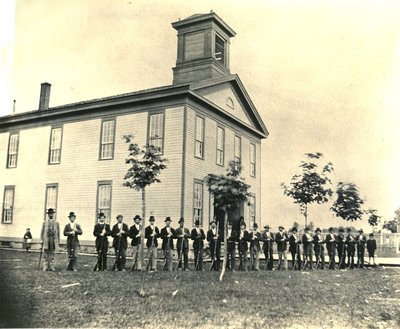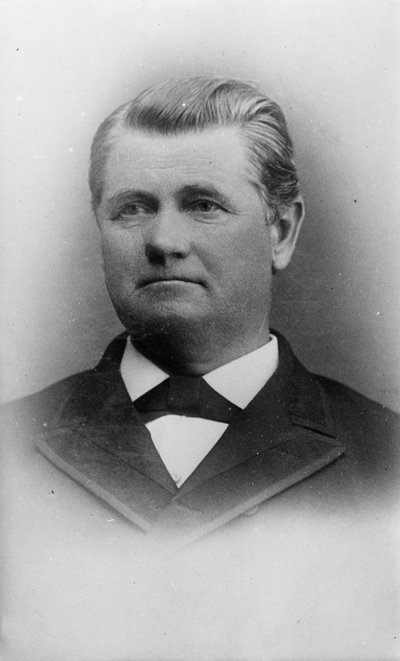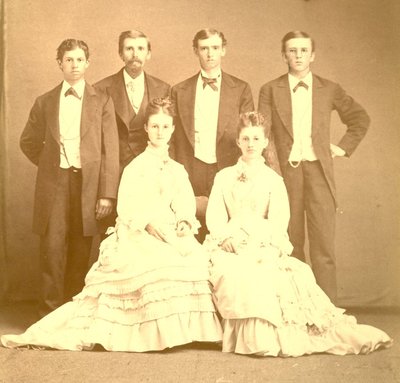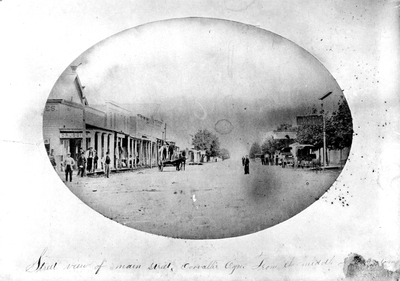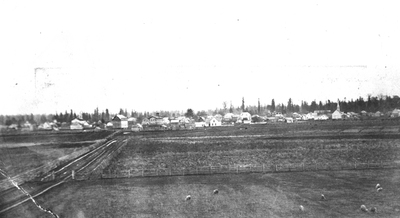1870-1879
1870
New agricultural curriculum announced (taught in the Department of Chemistry); 25 students from 11 Oregon counties enrolled. These students were appointed by state senators to obtain a higher education, with tuition paid by the state.
First class – one woman and two men – graduated with Bachelor of Science (B.S.) degrees: Alice Biddle, James K.P. Currin, and Robert M. Veatch. These were the first degrees granted in the western United States by a state-assisted college or university.
The college's Board of Commissioners issued their report on the location of the state land grant lands, which were mostly in Lake County. The lands were to be sold at not less than $2.50 per acre, with the funds used to create an endowment to support the college's agricultural and mechanical course of study.
Professor Joseph Emery elected librarian.
Tuition: $10.00 per term.
Enrollment: 169 at all levels; 28 at college level.
Population in Corvallis: apx. 1,200; in Benton County: 4,584; in Oregon: 90,923.
1871
As specified in the Morrill Act, which required that each land grant college own at least 35 acres of land, the Corvallis College Board of Trustees purchased a farm for $4,500 (with a house, barn and orchard), 34.85 acres in size, on April 17. This farm land thereafter was referred to as the Experimental Farm (and later as "Lower Campus"). Funding for the farm purchase came from more than 100 local citizens. No state money was involved in this purchase.
First Bachelor of Arts (A.B.) degree conferred.
1872
President Finley resigned, effective at the time of the Third Annual Commencement, due to the failing health of his wife and the desire to return to California.
Joseph Emery, A.B., D.D., Professor of Mathematics (1867-1885), appointed as acting president and head of the faculty (May 5 to August 30). During his incumbency, Emery submitted the first Biennial Report of the college to the Governor for the period 1870-1872.
Benjamin Lee Arnold, A.M. (August 31, 1872-January 30, 1892), appointed by the bishops of the Methodist Episcopal Church, South, as the second president of Corvallis College and the Agricultural College of Oregon following President Finley's resignation.
College budget – Income: $2,500.10; Expenditures: $2,619.60.
Institution name changed to Corvallis State Agricultural College.
Faculty totaled three members: Moral Philosophy and Physics, B. L. Arnold; Mathematics, Joseph Emery; and Languages, B. J. Hawthorne.
Faculty work schedule: eight hours of daily teaching and then supervision of the farm in the after-school hours.
First instruction in military science and tactics began in the fall under Arnold's instruction.
Student wage – 5 cents per hour.
During President Arnold's administration, labor by students on the college farm for one hour each day was compulsory and unpaid.
On October 15, the Oregon Legislative Assembly appropriated $5,000 to help fund the college.
1873
Corvallis State Agricultural College published its first agricultural research bulletin; the topics were "white soil" with suggested treatment and an analysis of "marl" from the Yaquina Bay district. This was the first scientific study made by the college in the field of agriculture.
Chair of Agriculture established under the direction of Professor B. J. Hawthorne. This is the first introduction of scientific agriculture instruction in the Pacific Northwest.
Captain Benjamin D. Boswell appointed Professor of Military Science and Tactics (1873-1876), the first U.S. Army officer on active duty to hold such a position in any land grant college in the West. (After Boswell's tour of duty, the position of Commandant of Cadets was assumed by President Arnold from 1876-1884).
The first cadet uniforms, worn at all times by male students, were gray with caps of the Civil War type. (Blue uniforms were first worn in 1893).
System of demerits adopted on September 10. Demerits were used to control discipline and social behavior. Dismissal = accumulation of 100 demerits (e.g., absence from class, 5-10 demerits; ladies and gentlemen conversing 5-25 demerits).
Alumni Association founded in February; first permananent officers were chosen in June: Hugh M. Finley, President; George F. Burkhart, Vice President; W.F. Herrin, Secretary; and Oscar L. Ison, Treasurer. A list of "Alumni et Alumnae" and current addresses was included in each edition of the college catalogue.
1874
Second Biennial Report (1872-1874) of the College issued by President Arnold. The report summarized the status of each department (languages, mathematics, military, moral science, and physical science).
Admission requirement: "Any youth 16 years of age, no other qualification being required".
Faculty totaled six members, including the president.
1876
Supplemental articles of incorporation filed with the Oregon secretary of state on January 4 as a means of stabilizing the college's financial situation.
The College's first Master of Arts (A.M.) degree conferred upon Franklin Cauthorn.
North wing and bell tower added to the college building.
First legislative support for the college library: the Oregon Legislative Assembly appropriated $1,000 to purchase books.
Greenhouse (called the glass house) built.
Name of institution – State Agricultural College (Corvallis College).
1878
The guns and rifles used in military drill were taken away to be used to quell an uprising of the Nez Perce Indians.
1879
Name of institution – Corvallis College and State Agricultural College.
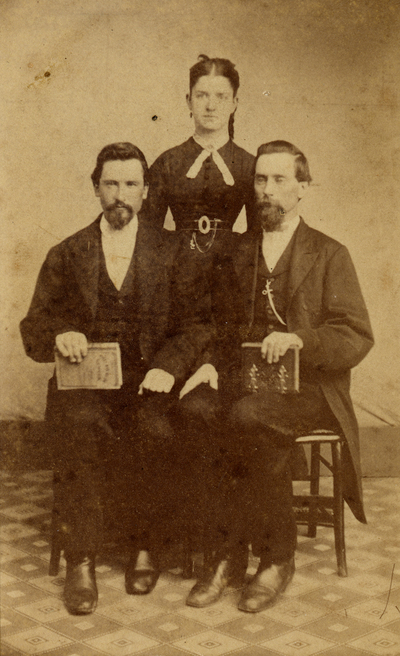
First class of Oregon Agricultural College graduates, 1870. From left: Robert M. Veatch, Alice E. Biddle, James K. P. Currin.

